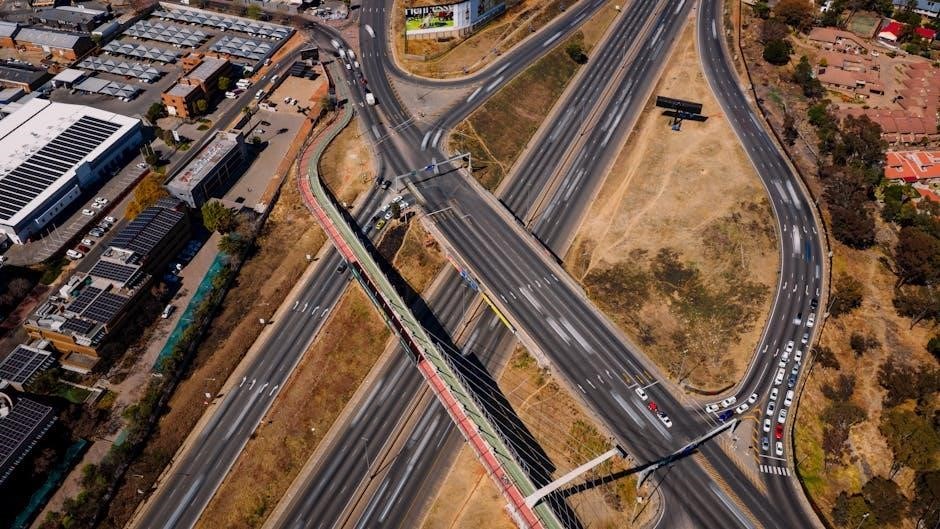Understanding car accident law is crucial for protecting your rights after a collision. It covers legal frameworks, responsibilities, and the process to ensure fair compensation for damages.
1.1 Understanding the Importance of Legal Knowledge After a Car Accident
Legal knowledge is vital after a car accident to navigate the complex process of claims and rights. Understanding your entitlements ensures you can seek fair compensation for damages or injuries. Knowing the law helps protect you from unfair practices by insurance companies or opposing parties. It also clarifies responsibilities, such as reporting the accident and gathering evidence. Legal awareness empowers you to make informed decisions, ensuring your rights are safeguarded throughout the process. This knowledge is essential for avoiding pitfalls and achieving a favorable outcome in your case.
1.2 Overview of Key Rights and Responsibilities
After a car accident, you have the right to seek compensation for damages and injuries. Key responsibilities include reporting the incident to authorities and providing accurate information. You must cooperate with insurance companies and avoid admitting fault. Understanding these rights and duties ensures a smooth legal process and protects your interests. Familiarizing yourself with these principles helps you navigate the system effectively and avoid potential legal or financial repercussions. Knowledge of your rights and responsibilities is fundamental to securing a fair resolution.
Immediate Steps to Take After a Car Accident
Ensure safety, stop, and turn on hazard lights. Exchange information, document the scene, and report the accident to police. Seek medical help if needed.
2.1 Ensuring Safety and Reporting the Accident
After a car accident, prioritize safety by stopping and turning on hazard lights. Check for injuries and provide assistance if needed. Move to a safe location if possible. Do not admit fault or discuss the accident. Contact the police to report the incident, especially if injuries or significant damage occurred. In many jurisdictions, accidents must be reported within 24 hours. Provide accurate details to authorities and retain a copy of the report, as it may be required for insurance claims or legal proceedings.
2;2 Documenting the Scene and Gathering Evidence
Documenting the accident scene is crucial for establishing facts and supporting your claim. Take clear photos of the vehicles, injuries, and surrounding area. Note the time, date, and weather conditions. Collect contact information from witnesses and any involved parties. Preserve physical evidence like skid marks or debris. Obtain a copy of the police report, as it often provides an impartial account. Keep records of medical treatment, repair estimates, and communication with insurance companies. This documentation will be vital when filing a claim or pursuing legal action.
2.3 Exchanging Information with Involved Parties

Exchanging information is essential after an accident to facilitate claims and legal processes. Collect the names, phone numbers, and insurance details of all parties involved. Note the vehicle makes, models, and license plate numbers. Provide your own information as required by law. Avoid discussing fault or accepting blame at the scene, as this could harm your case. Be polite and cooperative but refrain from offering unnecessary details. This exchange ensures everyone has the necessary contact information for future communication and proceedings. Keep the conversation factual and avoid speculation about the accident.

Legal Considerations After a Car Accident
Understanding your legal rights and responsibilities is vital. Reporting the accident to authorities and engaging legal representation can help navigate insurance claims and ensure fair compensation for damages.
3.1 Determining Fault and Liability
Determining fault and liability is critical in car accident cases. This involves analyzing evidence, such as witness statements, police reports, and vehicle damage, to establish who was responsible. Liability can be shared in some cases, depending on the jurisdiction, with comparative negligence rules applying. Understanding legal standards of fault is essential to pursue fair compensation. Consulting a car accident lawyer can help navigate complexities and ensure accountability. Accurate determination of liability directly impacts insurance claims and potential legal action, making it a cornerstone of car accident law.
3.2 Understanding Statute of Limitations for Filing Claims
The statute of limitations sets a time limit for filing car accident claims, varying by jurisdiction. Typically, this ranges from one to six years, depending on the type of claim. Missing this deadline can bar you from seeking compensation; It’s crucial to act promptly and consult a lawyer to ensure timely filing. The clock usually starts from the accident date or discovery of injuries. Knowing this timeframe helps protect your rights and avoids legal dismissal of your case due to delays.
3.3 Reporting the Accident to the Police
Reporting a car accident to the police is a critical step to ensure accountability and facilitate claims. Most jurisdictions require accidents involving injuries, fatalities, or significant damage to be reported promptly, often within 24 hours; You can usually do this by calling the non-emergency police number, such as 101 in some regions. A police report provides an official record of the incident, which is vital for insurance claims and legal proceedings. Failing to report may result in complications when seeking compensation or resolving disputes.
Insurance Claims and Your Rights
Understanding your rights when filing insurance claims is essential. Know your policy coverage, the claims process, and what to expect to ensure fair compensation for damages.
4.1 Navigating the Insurance Claims Process
Navigating the insurance claims process can be complex, but understanding the steps is key. After an accident, report it promptly and provide detailed documentation. Insurance companies typically assign an adjuster to assess your claim. Be prepared to submit evidence like medical records, repair estimates, and police reports. Keep communication clear and consistent to avoid delays. Knowing your policy coverage helps ensure you receive the compensation you’re entitled to. Stay informed and organized throughout the process to protect your rights effectively.
4.2 Types of Insurance Coverage and What They Cover
Understanding the types of insurance coverage is vital for protecting yourself financially after a car accident. Liability coverage pays for damages to others if you’re at fault. Collision coverage repairs your vehicle, regardless of fault. Comprehensive coverage handles non-collision incidents like theft or vandalism. Uninsured/underinsured motorist coverage protects you if the other driver lacks sufficient insurance. Each type serves a specific purpose, ensuring you’re covered in various scenarios. Knowing your policy details helps you make informed decisions and seek appropriate compensation when filing a claim.
4.3 What to Expect When Filing a Claim
Filing a car insurance claim involves several steps. First, notify your insurer promptly, providing details like the accident report and photos. They’ll assign an adjuster to assess damages. Be prepared to submit documentation, such as medical bills and repair estimates. The adjuster will evaluate your claim and determine the payout based on policy terms. Communication is key; stay informed and ask questions. Delays may occur, so patience is important. Ensure all paperwork is complete to avoid complications and expedite the process for a fair resolution.

Personal Injury Claims and Compensation
Personal injury claims help victims seek compensation for injuries sustained in car accidents. Medical records and evidence are crucial for building a strong case and securing fair payouts.
5.1 Understanding Personal Injury Claims
Personal injury claims allow victims to seek compensation for physical harm, emotional distress, or financial losses caused by a car accident. These claims typically involve proving fault and documenting damages. Medical records, witness statements, and expert testimonies are key evidence. The goal is to recover costs for medical bills, lost wages, and pain and suffering. Insurance companies or the at-fault party may be liable for payouts. Understanding the legal process and what constitutes a valid claim is essential for maximizing compensation and ensuring justice for those injured.
5.2 How to Pursue Fair Compensation
Pursuing fair compensation after a car accident requires thorough preparation and legal guidance. Start by documenting all injuries, medical treatments, and related expenses. Gather evidence, including police reports, witness statements, and photographs. Consulting a car accident lawyer can help you navigate the legal process and negotiate with insurance companies. Be cautious of early settlement offers that may undervalue your claim. Clearly communicate your needs and ensure all losses, including emotional distress, are considered. Persistence and transparency are key to securing a fair outcome, whether through settlement or court action.
5.3 The Role of Medical Records in Your Claim
Medical records play a critical role in supporting your car accident claim. They provide detailed documentation of injuries, treatments, and recovery progress, serving as evidence of the accident’s impact. Accurate and comprehensive records help establish causation between the accident and your injuries, strengthening your case. Missing or incomplete records can weaken your claim, so it’s essential to maintain thorough documentation. Regular medical check-ups and clear communication with your healthcare providers ensure your records are up-to-date. Your attorney will use these records to negotiate fair compensation, highlighting the full extent of your physical and emotional suffering.

Consulting a Car Accident Lawyer

A car accident lawyer specializes in navigating legal complexities, ensuring your rights are protected and advocating for fair compensation. They handle negotiations, paperwork, and court proceedings, alleviating stress and maximizing your recovery.
6.1 When to Seek Legal Representation

Seek legal representation if the accident resulted in serious injuries, significant property damage, or disputes over fault. A lawyer can help navigate complex legal processes, ensuring your rights are protected and maximizing compensation. They are particularly essential if the insurance company denies your claim or offers an unfair settlement. Consulting a lawyer early can prevent costly mistakes and provide peace of mind during a stressful time. Their expertise ensures you understand your options and receive the justice you deserve.
6.2 How a Lawyer Can Protect Your Rights
A car accident lawyer safeguards your rights by handling negotiations with insurers, ensuring fair compensation, and advocating for your best interests. They investigate the accident, gather evidence, and build a strong case to support your claim. Lawyers also protect you from admitting fault unintentionally and guide you through legal complexities. Their expertise ensures that your rights are not compromised, allowing you to focus on recovery while they manage the legal process and fight for the justice you deserve. Their support is invaluable in securing a fair outcome.
6.3 Free Consultations and Contingency Fees

Many car accident lawyers offer free consultations to discuss your case and options without upfront costs. This allows you to seek legal advice and understand your rights before committing. Contingency fees mean lawyers are paid only if they secure compensation for you, ensuring alignment with your interests. This arrangement makes legal representation accessible, as you don’t pay unless your case is successful. These practices reduce financial barriers and provide peace of mind while pursuing fair compensation for your injuries and losses.

Economic and Non-Economic Damages
Economic damages cover tangible losses like medical bills and lost wages, while non-economic damages address pain, suffering, and emotional distress. Both are vital for fair compensation.

7.1 Understanding Types of Damages
Economic damages cover tangible losses, such as medical bills, lost wages, and property damage, directly resulting from the accident. Non-economic damages address intangible harm, including pain, suffering, and emotional distress. Both types are essential for ensuring fair compensation. Economic damages are often easier to quantify, while non-economic damages require evidence like medical records and testimony to validate the severity of emotional or physical pain. Understanding these distinctions helps victims pursue the full scope of compensation they are entitled to after a car accident.
7.2 Calculating Compensation for Your Losses
Calculating compensation involves assessing both economic and non-economic damages. Economic damages are quantifiable, such as medical bills, lost wages, and property damage. Non-economic damages, like pain and suffering, are subjective but equally important. Insurance companies often use formulas to determine settlements, considering factors like injury severity, recovery time, and long-term impacts. Legal experts may also employ expert testimony or multipliers to estimate non-economic losses. Accurate documentation and professional guidance are essential to ensure fair evaluation and maximize compensation for all eligible damages resulting from the accident.
7.3 Proving Pain and Suffering
Proving pain and suffering requires detailed documentation of physical and emotional distress. Medical records, expert testimony, and personal journals can substantiate claims. Insurance companies often assess the severity and duration of suffering, using factors like treatment duration and impact on daily life. In some cases, multipliers are applied to economic damages to estimate non-economic losses. Legal professionals can help present evidence effectively, ensuring fair compensation for intangible harms like mental anguish or loss of enjoyment of life. Accurate and thorough documentation is crucial to validate these subjective yet significant damages.
Avoiding Mistakes After a Car Accident
Avoid leaving the scene, admitting fault, or failing to document evidence. Stay calm, seek medical help, and consult a lawyer to protect your rights and claim.
8.1 Common Pitfalls to Avoid
Avoid leaving the accident scene, as this can lead to legal consequences. Never admit fault, even if you think you were responsible. Failing to document the scene or seek medical attention can harm your claim. Refraining from consulting a lawyer may result in unfair compensation. Additionally, avoid posting about the accident on social media, as this could be used against you. Lastly, never ignore the advice of legal or medical professionals, as this can jeopardize your case and rights.
8.2 The Impact of Social Media on Your Claim
Social media can significantly impact your car accident claim. Insurance companies often monitor platforms for posts related to accidents. Sharing details, photos, or opinions about the incident can be misinterpreted or used as evidence against you, potentially reducing your compensation. Avoid posting about injuries, fault, or recovery, as these can undermine your case. Even seemingly harmless updates can raise doubts about the severity of your situation. Consult your lawyer before sharing anything online to protect your claim and ensure your rights remain intact.
8.3 Why You Shouldn’t Admit Fault
Admitting fault after a car accident can severely harm your claim. Even a simple apology or statement like “I’m sorry” can be interpreted as accepting blame. Insurance companies may use this to reduce or deny compensation. Fault determination should be left to professionals, such as police, insurance adjusters, or lawyers. Stay silent about the accident details and avoid discussing responsibility until consulting a legal expert. This protects your rights and ensures you receive fair compensation for your losses. Remember, anything you say can be used against you in legal proceedings.